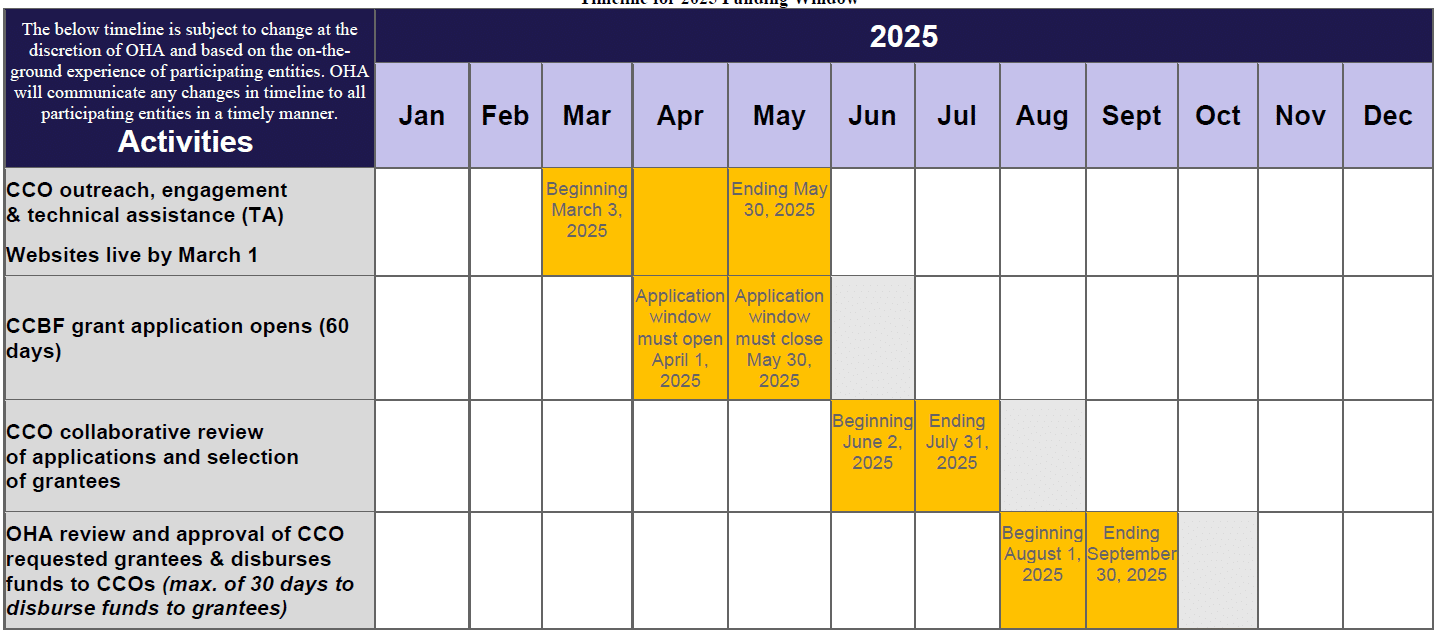Community Capacity Building Funds
Community-based organizations (CBOs) and partners will be integral to this HRSN work and may be able to receive funding to help with these efforts. Oregon has been approved to spend up to $119 million in Community Capacity Building Funds (CCBF), specifically to support investments to enable partners to provide HRSN services.
For 2025, Advanced Health has a total of $2,300,278 to distribute
CCO Priority areas for 2025 CCBF:
- Local Food Resources/Providers
- Culturally Specific Connector organization/Community Benefit Organizations
- Housing Navigation Organizations
- Contractors for home modifications/remediation
CCO Overview of process for evaluating applications:
- CCBF Application
- CCBF Application Rubric
- CCBF Budget Template
- Advanced Health convenes a committee of internal staff and external partner organizations to review each application and budget submitted. This group completes the rubric for each and has a robust discussion including recommended actions for funding.
CCO CCBF Point of Contact: Amanda McCarthy, Director of Social Determinants of Health (amanda.mccarthy@advancedhealth.com)
CCO HRSN Service Provider contract requirements:
-
- CCBF awarded organizations are strongly encouraged to contract with Advanced Health as HRSN Service Providers. This includes:
- Obtain Oregon DMAP ID number for billing purposes.
- Sign a Business Associate Agreement to receive member PHI
- Fulfil obligations related to participating in the Closed Loop Referral Process by way of acceptance and confirmation of process
- Attest to compliance with all reporting and oversight requirements established by OHA and/or Advanced Health; applicable laws relating to privacy and security.
- Provider must provide documentation stating the date, time, duration, and description of the Outreach & Engagement services provided to Advanced Health Members, if applicable.
- Complete all Oregon Health Authority required documentation for HRSN services
- Meet all applicable timelines as outlined in provider contract
- Bill Advanced Health for HRSN services rendered using appropriate fee schedule and required data elements.
- CCBF awarded organizations are strongly encouraged to contract with Advanced Health as HRSN Service Providers. This includes:
- HRSN Provider Qualifications and Resources (link: https://www.oregon.gov/oha/HSD/Medicaid-Policy/Pages/HRSN-Providers.aspx)
More information is available on the OHA’s 1115 Medicaid Waiver website
CCBF will support HRSN service providers and organizations that will become HRSN providers to develop what they need to be able to participate in the Medicaid delivery system and deliver HRSN services to qualified OHP members.
Organizations that may be eligible for CCBFs include community-based organizations, patient health organizations, social service agencies, traditional health workers, child welfare providers, government entities with community health workers, and schools. Organizations eligible for CCBF include those that:
• intend to serve eligible populations
• have strong community relationships
• have the ability to provide HRSN services in a way that is culturally responsive and ensures meaningful access to language services
• meet Centers for Medicare & Medicaid Services (CMS) requirements
HRSN providers are organizations that will provide HRSN services in a way that is culturally and linguistically appropriate, responsive and trauma-informed2. All contracted HRSN providers must meet certain provider qualifications. These qualifications are further defined in the HRSN Provider Guidance document that is available on the OHA’s 1115 Medicaid Waiver website.
The CMS approved HRSN Infrastructure Protocol outlines the specific allowable uses of these funds. The funds can only be spent on the specific allowable uses. There are four main categories that the funds can be used for:
Technology:
Procuring IT infrastructure/data platforms/systems needed to enable, for example:
o Authorization of HRSN services
o Documentation of eligibility for HRSN services and track enrollment
o Closed loop referral to HRSN services
o Record plans of care
o HRSN service delivery
o HRSN service billing
o HRSN program oversight, monitoring and reporting, including for activities beyond HRSN infrastructure (e.g., reporting on HRSN services delivered, monitoring to ensure members receive the services for which they were authorized, activities to prevent fraud, waste and abuse across the HRSN program)
o Determine eligibility for other federal, state and local programs including Supplemental Nutrition Assistance Program (SNAP) and/or Women, Infants and Children (WIC)
• Modifying existing systems (e.g., community information exchange) to support HRSN
• Development of an HRSN eligibility and services screening tool
• Integration of data platforms/systems/tools
• Onboarding to new, modified or existing systems
• Training for use of new, modified or existing systems
Development of business or operational practices:
Development of polices/procedures related to:
o HRSN referral and service delivery workflows
o Billing/invoicing
o Data sharing/reporting
o Program oversight/monitoring
o Evaluation
o Privacy and confidentiality
• Training/technical assistance on HRSN program and roles/responsibilities
• Administrative items necessary to perform HRSN duties and/or expand HRSN service delivery capacity (e.g., purchasing of a commercial refrigerator to expand capacity to provide additional medically tailored meals to qualifying members)
• Procurement of administrative supports to assist implementation of HRSN
Workforce development:
• Cost of recruiting, hiring and training new staff to provide HRSN
• Salary and fringe for staff that will have a direct role in overseeing, designing, implementing and/or executing HRSN responsibilities, time limited to a period of 18 months.
• Necessary certifications, training, technical assistance and/or education for staff participating in the HRSN program (e.g., on culturally competent and/or trauma informed care)
• Privacy/confidentiality training/technical assistance (TA) related to HRSN service delivery
• Production costs for training materials and/or experts as it pertains to the HRSN program
Outreach, education and convening:
• Production of materials necessary for marketing, outreach, training and/or education related to HRSN.
• Translation of materials
• Planning for and facilitation of community-based outreach events to support awareness of HRSN services
• Planning for and facilitation of learning collaboratives or stakeholder convenings for HRSN
• Community engagement activities necessary to support HRSN program implementation and launch (e.g., roundtable to solicit feedback on guidance documents)
• Administrative or overhead costs
How To Apply
To apply, complete the CCBF Application and CCBF Budget Template and email to socialhealth@advancedhealth.com

